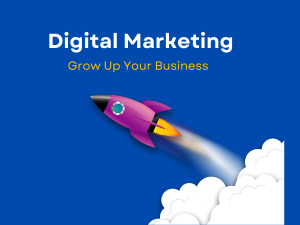In today’s digital age, having an online presence is no longer just an option; it’s a necessity—especially for small businesses. Digital marketing provides powerful tools and strategies that can significantly enhance visibility, engagement, and revenue. Let’s explore how digital marketing can be a game-changer for small businesses.
1. Increased Visibility
One of the most significant benefits of digital marketing is increased visibility. With billions of people online, the potential audience is vast. Digital marketing strategies such as Search Engine Optimization (SEO) help small businesses improve their website rankings on search engines, making it easier for customers to find them.
How It Works:
- SEO Techniques: By optimizing website content with relevant keywords, small businesses can appear on the first page of search results, attracting more organic traffic.
- Local SEO: For businesses with physical locations, local SEO ensures they show up in local searches, helping them connect with nearby customers.
2. Cost-Effective Advertising
Traditional marketing methods can be expensive, often putting them out of reach for small businesses. Digital marketing offers cost-effective alternatives that can yield high returns on investment (ROI).
How It Works:
- Social Media Ads: Platforms like Facebook and Instagram allow businesses to run targeted ad campaigns without breaking the bank.
- Pay-Per-Click (PPC) Advertising: With PPC, you only pay when someone clicks on your ad, ensuring you get value for your money.
3. Building Brand Awareness
Digital marketing helps small businesses build brand awareness and establish a strong online identity. By consistently creating valuable content and engaging with customers, businesses can develop a loyal following.
How It Works:
- Content Marketing: Regular blog posts, videos, and infographics that resonate with your audience can position your brand as an industry leader.
- Social Media Engagement: Interacting with followers on social media fosters a sense of community and encourages word-of-mouth marketing.
4. Enhanced Customer Engagement
Engaging with customers has never been easier thanks to digital marketing. Businesses can communicate directly with their audience through various online platforms, fostering a two-way dialogue.
How It Works:
- Social Media Interaction: Responding to comments, messages, and reviews shows customers that you value their opinions.
- Email Marketing: Sending personalized emails allows businesses to share updates, promotions, and valuable content, keeping customers informed and engaged.
5. Access to Valuable Analytics
Digital marketing provides small businesses with valuable insights into customer behavior and preferences. Analytics tools enable businesses to track the effectiveness of their campaigns and make data-driven decisions.
How It Works:
- Website Analytics: Tools like Google Analytics allow businesses to monitor traffic sources, user behavior, and conversion rates.
- Social Media Insights: Most platforms offer analytics that show engagement levels, helping businesses refine their strategies.
6. Competitive Advantage
In a competitive landscape, digital marketing can give small businesses the edge they need. By leveraging online strategies, even the smallest companies can compete with larger brands.
How It Works:
- Targeted Marketing: Digital marketing allows for hyper-targeted campaigns, ensuring that your message reaches the right audience.
- Brand Storytelling: Small businesses can share their unique stories and values, differentiating themselves from competitors.
7. Flexibility and Adaptability
Digital marketing strategies are highly adaptable, allowing small businesses to pivot quickly in response to market changes or emerging trends. This flexibility is crucial in today’s fast-paced environment.
How It Works:
- Real-Time Adjustments: Campaigns can be adjusted on the fly based on performance metrics, ensuring that resources are allocated effectively.
- Experimentation: Small businesses can test different strategies and channels without significant risk, finding what works best for their audience.
Conclusion: Empowering Small Businesses for Success
Digital marketing is not just a trend; it’s a vital component of business strategy for small enterprises. By harnessing the power of online tools and platforms, small businesses can increase visibility, engage with customers, and drive growth in once unimaginable ways.
If you haven’t already, it’s time to embrace digital marketing and unlock the potential of your small business. With the right strategies in place, the possibilities are endless!


